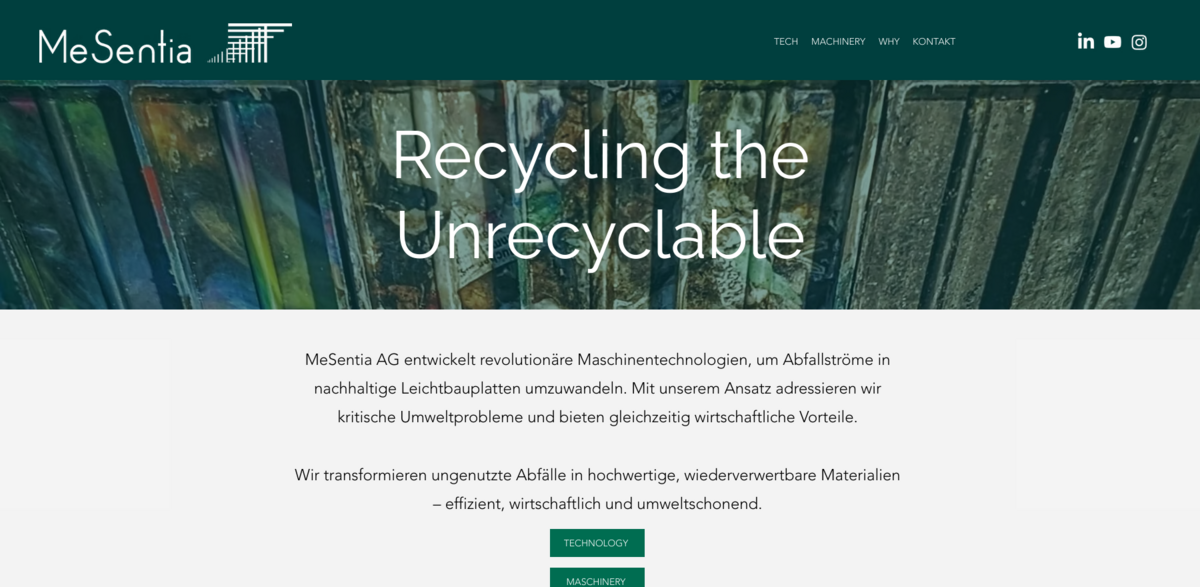What is MeSentia’s Project All About?
MeSentia AG is shaking up the recycling world with revolutionary machinery technologies designed to convert waste streams into sustainable lightweight panels. Their approach tackles some of the most critical environmental issues while delivering economic benefits. Simply put, they transform unused waste into high-quality, recyclable materials — efficiently, economically, and in an environmentally friendly way. It’s recycling, but reimagined.
The Main Benefit: Turning Waste into Value
MeSentia’s innovation addresses one of the biggest challenges in waste management today. Here’s a quick snapshot of what makes their solution stand out:
- Over 65% of all plastic waste is economically unrecyclable and often ends up in landfills or nature.
- Only 9% of plastic waste is currently recycled; the rest is incinerated, landfilled, or simply wasted.
- MeSentia’s technology produces fully edge-sealed honeycomb panels from recycled plastics.
- The logistics modules created are 100% recyclable and significantly lighter — about two-thirds lighter than traditional wooden pallets.
- These lightweight panels and modules are made from fully reusable materials, creating a truly circular economy.
Technology Behind the Innovation
The heart of MeSentia’s project lies in its patent-pending process and device for producing sustainable lightweight panels. This isn’t just any recycling tech — it’s modular, scalable machinery that revolutionizes how low-quality plastic waste is handled. The process is protected by a European patent application filed in July 2023, which has already been confirmed in 11 key points by EU examiners. Efforts to secure global intellectual property rights are ongoing, signaling a strong commitment to innovation and protection.
Technology Readiness Level and Development Roadmap
Currently, MeSentia’s infrastructure has successfully reached Technology Readiness Level (TRL) 5, meaning it’s been thoroughly tested and validated in laboratory conditions as of 2023. The next big leap is the development of MESE001-2025, a state-of-the-art prototype machine aimed at achieving TRL 6+. This prototype will be tested and optimized under real-world conditions, paving the way for scalable, market-ready solutions.
Looking ahead, the company plans to reach TRL 9 within 1 to 3 years — the highest standard for industrial readiness. This includes:
- Demonstrator and research project #01/#X01 targeting TRL 6, focusing on construction techniques over 9 months.
- Project #02, a fully automated production line for pallets (logistics module), aiming for TRL 7/8 within 15 months, with an annual capacity of 800,000 to 1,300,000 pallets.
- Project #03, a simplified version producing a single type of lightweight panel, remotely operated with robotic systems.
Revolutionizing Circular Logistics Modules
MeSentia isn’t just about panels — it’s about creating a circular future for logistics. Their logistics modules are a game-changer: 100% recyclable, made from fully reusable materials, and significantly lighter than traditional wooden pallets. This means less waste, lower transportation costs, and a smaller carbon footprint. By embracing circularity, MeSentia is leading the charge toward a better, more sustainable planet.
Project Impact on Sustainable Development Goals (SDGs)
- SDG 12: Responsible Consumption and Production — promoting sustainable waste management and recycling.
- SDG 13: Climate Action — reducing landfill waste and lowering carbon emissions through lightweight, recyclable materials.
- SDG 9: Industry, Innovation, and Infrastructure — developing cutting-edge, scalable machinery technology.
- SDG 11: Sustainable Cities and Communities — minimizing plastic pollution and waste in urban environments.
- SDG 8: Decent Work and Economic Growth — creating economic benefits through innovative recycling solutions.
Looking Forward: The Future of Waste Recycling
MeSentia’s journey is just beginning. With a clear development plan and ambitious goals, the company is set to transform the recycling industry. Their approach not only tackles the massive problem of plastic waste but also creates economic opportunities and supports a circular economy. As the technology advances from lab tests to real-world applications, the potential to scale and impact global waste management is enormous. It’s a bold vision — turning one of the biggest waste challenges into a profitable, sustainable solution. And honestly, that’s something worth watching closely.


















